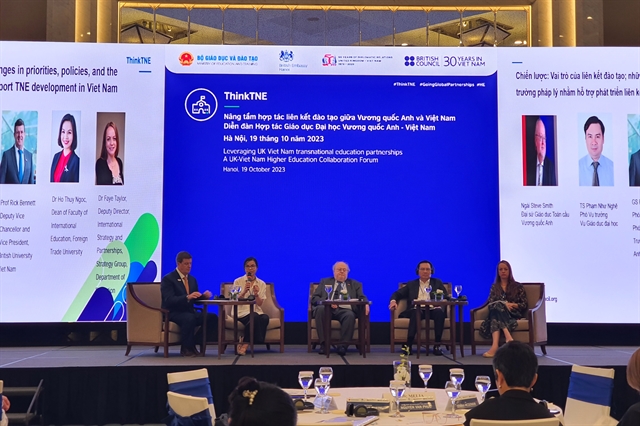 Society
Society


|
| Speakers discuss leveraging the Việt Nam-UK transnational education partnerships at the forum on Thursday. — VNS Photo Nhật Hồng |
HÀ NỘI — Transnational education can go beyond academic values to provide economic benefits in national competitiveness, sustainable communities and gender equality, said Professor Sir Steve Smith, UK Government International Education Champion at a transnational education forum between the UK and Việt Nam on Thursday.
The event, co-organised by the Vietnamese Ministry of Education and Training (MoET), the British Embassy in Hà Nội and British Council, attracted around 200 higher education leaders from both countries to facilitate knowledge and experience exchanges, while also presenting insights from case studies for future partnerships.
There are currently more than 7,100 students in Việt Nam studying the UK university curriculum, of which 6,000 are in person and the remainder online.
Highlighting that the overarching theme of transnational education today is of ever-growing importance in the world of higher education, Professor Sir Smith said: “Together with our Vietnamese counterparts and partners, we view this as a promising platform to expand on, to enable a more inclusive, equitable and affordable option to study, at the highest of levels.’’
A memorandum of understanding (MOU) on education between the Vietnamese and UK governments was signed in October 2019, aiming to promote educational cooperation in higher education, English training, educational technology, international education and preschool education.
According to the British Council in Việt Nam, the UK is ranked first among countries with the largest number of transnational education programmes and fourth among the preferred English-speaking study destinations in Việt Nam.
The UK-Việt Nam cooperation in higher education now has partnerships with 25 UK universities, with 101 joint programmes.
Addressing the event, Deputy Minister of Education and Training Nguyễn Văn Phúc said: “The relations between the two countries have seen strong developments, of which education is a key area.”
He believed that in the future, Việt Nam and the UK will see more cooperation achievements in the sector, particularly higher education.
The forum also introduces a report titled “Towards a more competitive environment for transnational education in Việt Nam” which is carried out by the British Embassy in Hà Nội, the British Council and the MoET.
According to the document, transnational education contributes to an increased supply of higher education, while also reducing brain drain and supports brain circulation by attracting talent to the location of programme delivery.
Data from the report also revealed that Việt Nam is the world’s third largest sender of globally mobile students, after China and India.
Therefore, transnational education widens access to international degrees to students who can’t afford to study overseas, or are unable to access the local higher education system because of family or work commitments.
Noting that Việt Nam has a favourable regulatory framework for transnational education, the report also recommends that the country adopts simple and clear guidance on how to engage in these programmes.
Partnerships between higher education institutions are more than collaborations, British Council Vietnam director Donna McGowan said, added that these are the bridges that connect the two nations, build trust, foster mutual understanding, promote cultural exchange and ultimately drive progress.
She said: “In today's rapidly changing world, the importance of international collaboration and education cannot be overstated.
“The challenges we face from global pandemics to climate change to the emergence of new technology require solutions that transcend borders, and the UK-Việt Nam transnational education partnerships are powerful tools to help address these challenges.”
Guests also participated in discussions regarding global trends and local opportunities in transnational education partnerships and the evolving landscape of international education.
They also discussed the strategic aspects of transnational education, examining its role and the changing priorities, policies, and regulatory frameworks necessary to facilitate its development in Việt Nam and beyond. — VNS




